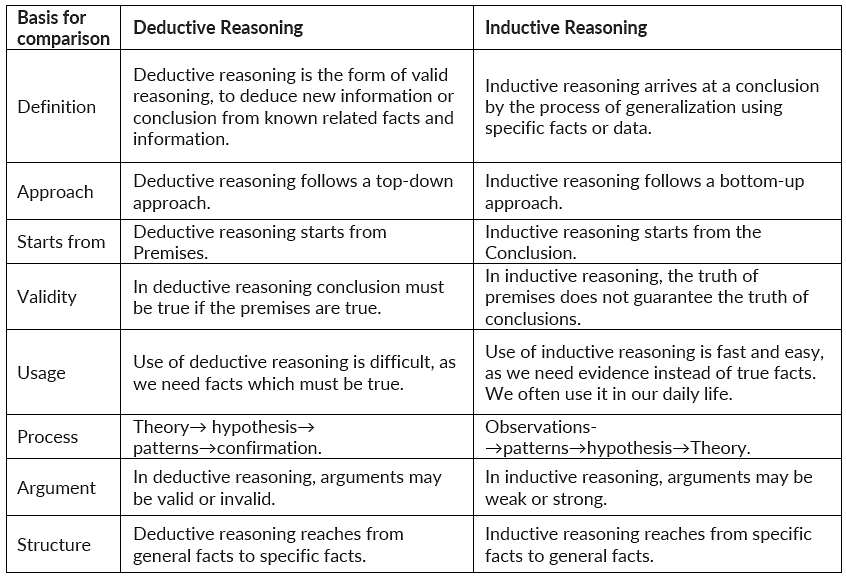Study Deductive and Inductive Reasoning - 2 - Logical Reasoning Notes
Difference between deductive and inductive reasoning

Informal Reasoning
- Informal reasoning refers to the use of logical thought, and the principles of logic, outside of a formal setting. Basically, informal logic uses the application of everyday knowledge, education and thinking skills to analyze and evaluate information.
- It allows people to rationalize the communications they see on a daily basis, whether through social media, television, websites, etc. Two strategies used in informal reasoning are to analyze and evaluate.
- To analyze means to examine the details of information to come to a conclusive picture at the end of the analysis; on the other hand, to evaluate means to determine the merit or worth of something.
Example of informal formal reasoning includes
- The doctor who seeks to determine the best treatment.
- A factory owner who wants to increase production.
Abductive reasoning
Abduction reasoning is a method of reasoning in which one chooses the hypothesis that would, if true, best explain the relevant evidence. Abductive reasoning starts from a set of accepted facts and infers most likely, or best, explanations.
Example: "When it rains, the grass gets wet. The grass is wet, it must have rained.
Practice Questions
Q. Which type of arguments is considered as particular to general?
(a) Deductive arguments
(b) Inductive arguments
(c) Informal arguments
(d) Abductive arguments
Correct Answer is Option (b)
Inductive arguments are that argument which takes specific information and makes broader generalised arguments. It is considered as particular to general.
Premises: All cats have long tails.
John is a dog.
Conclusion: Therefore, John has tails.
Q. What type of argument is it?
(a) Deductive arguments
(b) Inductive arguments
(c) Informal arguments
(d) Abductive arguments
Correct Answer is Option (a)
Deductive arguments are that argument which starts from general statements and check the possibilities to reach a specific, logical conclusion. It is considered as general to particular.
Premises: Australia has won 5 cricket world cups
Conclusion: Therefore, Australia will win the upcoming cricket world cup.
Q. What type of argument is it?
(a) Deductive arguments
(b) Inductive arguments
(c) Informal arguments
(d) Abductive arguments
Correct Answer is Option (b)
Inductive arguments are that argument which take specific information and make broader generalised arguments. It is considered as particular to the general. Here, specific information (Australia has won 5 world cups) is taken to conclude that Australia will upcoming cricket world cup.
|
31 videos|46 docs|14 tests
|
















